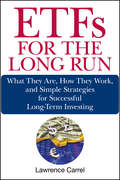- Table View
- List View
ESG als Treiber von M&A: Unternehmenskäufe und -zusammenschlüsse erfolgreich managen
by Oliver Everling Markus B. Hofer Rudolf Schmitz Karl A. Niggemann Ulrich DahlhausenDieses Buch bietet den Leserinnen und Lesern einen einzigartigen Zugang zum Thema "Erfolgreiches Management von Unternehmenstransaktionen", insbesondere im Kontext vonMergers & Acquisitions (M&A) und Rating:● Umfassendes Fachwissen: Unsere Autorinnen und Autoren sind ausgewiesene Experten auf ihrem Gebiet und verfügen über langjährige Erfahrung in der Branche. Ihr fundiertesWissen wird in diesem Buch umfassend vermittelt.● Praxisorientierte Ansätze: Das Buch enthält zahlreiche praxisnahe Ansätze, Fallstudien und bewährte Methoden, die Leserinnen und Lesern helfen, reale Herausforderungen im Management von Unternehmenstransaktionen zu bewältigen.● Ratings im Fokus: Wir legen besonderen Wert auf die Bedeutung von Ratings in M&A-Transaktionen und zeigen auf, wie diese den gesamten Transaktionsprozess beeinflussen können.● Aktualität und Zukunftsperspektiven: Wir beleuchten aktuelle Trends und Entwicklungen im M&A-Bereich des Gesundheitswesens und bieten einen Ausblick auf die zukünftige Entwicklung dieses wichtigen Wirtschaftszweigs.● Lösungen für komplexe Probleme: Das Buch präsentiert praxiserprobte Lösungen für komplexe Herausforderungen im Unternehmensmanagement und in Transaktionsprozessen insbesondere am Beispiel der Medizintechnik.● Wertsteigerung für Unternehmen: Unsere Methoden und Ratschläge zielen darauf ab, den Wert von Unternehmen zu steigern und den Erfolg von Transaktionen sicherzustellen. Letztendlich bietet unser Buch einen wertvollen Leitfaden für Unternehmensinhaber, Führungskräfte und Experten, die M&A-Transaktionen erfolgreich durchführen möchten, sei es inBezug auf Bewertung, Due Diligence, Verhandlungen oder Integration. Wir vermitteln praxiserprobte Strategien und Ansätze, um die Erfolgschancen von Unternehmenstransaktionen zu maximieren und die mit ihnen verbundenen Risiken zu minimieren. Dieses Buch ist ein unverzichtbares Werkzeug für alle, die in der Welt der Unternehmensentwicklung tätig sind.
ESG in der globalen Logistik klipp & klar (WiWi klipp & klar)
by Natalie Janning-Backfisch Julia Hansch Michael SchröderDieses Buch gibt einen umfassenden Einblick, wie sich die globale Logistik im Zeitalter des globalen Miteinanders verändert. Es wird allgemeine Managementaufgabe, entlang der gesamten Wertschöpfungskette Umweltschutz, soziale Normen und moralisch-rechtlich korrekte Unternehmensführung in Organisationen und Prozessen durchzusetzen und zu leben. In Theorie und Praxis wird dies unter dem Dach des Akronyms ESG (Environment, Social, Governance) zusammengeführt. Ziel dieses Buches ist es, ESG in seinen Bestandteilen und Facetten zu erkennen, zu systematisieren und die Auswirkungen auf Unternehmen zu diskutieren. Logistische Prozesse finden sich in allen materialflussorientierten Unternehmen der Wertschöpfungskette, weshalb in diesem Buch neben den klassischen Logistikdienstleistern auch produzierende Unternehmen und der Handel angesprochen sind. Betrieblichen Entscheidern werden Handlungsoptionen vermittelt. Das Buch richtet sich an Studierende, insbesondere der Betriebswirtschaft und des Wirtschaftsingenieurswesens, sowie an Fach- und Führungskräfte materialflussorientierter Unternehmen. Bonus: Laden Sie die Springer-Nature-Flashcards-App kostenlos herunter und nutzen Sie exklusives Zusatzmaterial, um Ihr Wissen zu prüfen.
ESG, CSR und SDG als langfristiger Wettbewerbsvorteil: Nachhaltigkeit durch innovative Konzepte, Methoden und Tools
by Marc Helmold Florian Hummel Jürgen Fritz Johannes TreuDieses Buch vermittelt praxisrelevantes Wissen, wie Unternehmen und Organisationen langfristig Wettbewerbsvorteile durch ESG, SDG und CSR erreichen können. Es richtet sich an Mitarbeiter in den Bereichen Qualität, Entwicklung, Einkauf, Logistik, Marketing und Vertrieb, die in der Wertschöpfungskette direkt oder indirekt an der betrieblichen Leistungserstellung tätig sind. Lehrende und Studierende erhalten durch Praxisbeispiele und Definitionen ein gutes Verständnis für erfolgreiches Nachhaltigkeitsmanagement.
ESG-Reporting in der Unternehmenskommunikation: Was die EU-Regulierung für die Unternehmensberichterstattung bedeutet
by Michael Neumann Jörg ForthmannDieses Buch zeigt auf, welche Herausforderungen die hochkomplexe ESG-Regulierung an die Kommunikation von Unternehmen stellt – und wie diese gemeistert werden können. Mit Beginn des Jahres 2024 werden die Anforderungen an die Umwelt-, Sozial- und Governance-Berichterstattung deutlich erhöht. Die Corporate Sustainability Due Diligence Directive (CSDDD oder CS3D) der EU verlangt von mehr Unternehmen aller Größen detaillierte Erklärungen zur Vereinbarkeit des Geschäftsmodells mit ESG-Standards.Diese neue Ära der Unternehmensberichterstattung muss von Experten aus der Unternehmenskommunikation, der Kapitalmarktkommunikation und dem Rechnungswesen gemeinsam angegangen werden, um die Überzeugungskraft, die Reichweite und das krisenfeste Narrativ der ESG-Berichterstattung zu stärken. Die Autoren erläutern, welche Aspekte und Perspektiven hierbei besonders entscheidend sind und wie Unternehmensverantwortliche ihr Reden und Handeln immer wieder neu gewichten und austarieren können.
ESG: Eine Eignungsanalyse ausgewählter Standardkriterien (essentials)
by Ralf B. Schlemminger Rebekka Erchinger Rosemarie KochIn diesem Buch werden die drei bedeutsamsten Standardkriterienkataloge mittels eines Scoring-Modells auf ihre Eignung zum Aufbau bzw. zur Weiterentwicklung einer nachhaltigen Unternehmensführung geprüft. Implementierungshinweise für die Praxis sowie Anregungen zur Weiterentwicklung und Verbesserung ihrer Kriterien durch die Standardsetzer werden gegeben.
ESG: Nachhaltigkeit als strategischer Erfolgsfaktor (SDG - Forschung, Konzepte, Lösungsansätze zur Nachhaltigkeit)
by Klaus Rainer Kirchhoff Sönke Niefünd Julian A. von PressentinImmer mehr Investoren haben ESG-Kriterien in ihre Investitionskriterien integriert und immer mehr Banken ergänzen ihre Vergaberichtlinien für Kredite um ESG-Aspekte. Mit einer gelebten ESG-Strategie und ESG-Kommunikation werden Unternehmen für Investoren und Banken folgerichtig attraktiver.Dieses Buch soll Unternehmern und Managern zeigen, wie sie zu einer überzeugenden ESG-Strategie kommen und wie sie diese professionell kommunizieren.
ESG: Sustainability as a Strategic Success Factor
by Klaus Rainer Kirchhoff Sönke Niefünd Julian von PressentinMore and more investors have integrated ESG criteria into their investment criteria, and an increasing number of banks are supplementing their lending guidelines with ESG aspects. With a lived ESG strategy and ESG communication, companies consequently become more attractive to investors and banks. This book aims to show entrepreneurs and managers how to develop a convincing ESG strategy and how to communicate it professionally.
ESPN The Company
by Keith Hollihan Anthony F. SmithA fascinating look at ESPN and its success as a brandESPN The Company reveals the inside scoop on the biggest business story in sports, detailing the creative and innovative spirit and practices that drove the programming, products, and services of the most powerful and prominent name in sports media. The authors provide a behind-the-scenes perspective on how ESPN dealt with their many partners and how they handled mistakes and missteps along the way-from the humble beginnings of ESPN as an underrated startup to the pinnacle of their success as a major industry player.ESPN and other great organizations invest in their people. They train them. They believe that if you spend the time and resources turning talented performers into leaders, you're going to get better organizational performance and engender higher levels of commitment and sweat. ESPN The CompanyExplores the dedication to excellence that makes ESPN the "Worldwide Leader in Sports" Reveals how the steps ESPN has taken to excel can be applied to whatever type of business you're inShares the lessons learned at ESPN about launching and growing a wildly successful enterpriseEngaging and informative, this entertaining guide reveals how any company can benefit by embracing the best practices of ESPN.
ESPN: The Making of a Sports Media Empire
by Travis VoganOnce a shoestring operation built on plywood sets and Australian rules football, ESPN has evolved into a media colossus. A genius for cross-promotion and its near-mystical rapport with its viewers empower the network to set agendas and create superstars, to curate sports history even as it mainstreams the latest cultural trends. Travis Vogan teams archival research and interviews with an all-star cast to pen the definitive account of how ESPN turned X's and O's into billions of $$$. Vogan's institutional and cultural history focuses on the network since 1998, the year it launched a high-motor effort to craft its brand and grow audiences across media platforms. As he shows, innovative properties like SportsCentury, ESPN The Magazine , and 30 for 30 built the network's cultural caché. This credibility, in turn, propelled ESPN's transformation into an entity that lapped its run-of-the-mill competitors and helped fulfill its self-proclaimed status as the "Worldwide Leader in Sports." Ambitious and long overdue, ESPN: The Making of a Sports Media Empire offers an inside look at how the network changed an industry and reshaped the very way we live as sports fans.
ESTANFLACION (EBOOK)
by Domingo CavalloSi bien entre 1991 y 2001 conocimos una década de estabilidad de precios, desde 2002 en adelante la inflación está de nuevo entre nosotros y nadie sabe por cuánto tiempo más. Hay mucha inflación reprimida por controles e intervenciones distorsivas del Estado en todos los mercados. Cómo hacer para que ésta no se descontrole y volvamos a vivir la tan odiada hiperinflación? Qué es la inflación y cómo combatirla? Se trata de una enfermedad, una suerte de robo serial facilitado por el engaño que lleva a que las instituciones funcionen cada vez peor y la desconfianza se extienda a todos los terrenos de la sociedad. Esconde los actos de corrupción y les brinda impunidad. Reconociendo sus errores y equivocaciones, el autor, que ha dedicado su vida profesional al estudio y combate de la inflación, decide escribir este libro para ayudar a entender la naturaleza de esta terrible enfermedad social y para que seamos capaces de elegir, y luego apoyar, a gobiernos que tengan el firme propósito de encontrar una cura.
ETFs For Canadians For Dummies
by Russell Wild Bryan BorzykowskiBreak into the exciting Canadian market for exchange-traded funds Exchange-traded funds (ETFs) are an increasingly popular part of the investing landscape, being less volatile than individual stocks, cheaper than most mutual funds, and subject to minimal taxation. ETFs For Canadians For Dummies will guide you through the process of investing in ETFs in Canada, a smaller and sometimes riskier market. You&’ll get the most up-to-date information on the ETF investing landscape, and we&’ll help you figure out how to navigate the fast-changing marketplace. This book makes it all easy to understand, and offers updated info on the available ETFs, investment and tax laws, and market projections. Invest your money wisely in the Canadian ETF market Maximize your profits when you trade on the stock market Discover how investing in Canada is different from investing elsewhere Learn how to invest online with the latest apps and other toolsThis is the book for Canadian investors who want to diversify their investment portfolio and break into exchange traded funds. With the help of Dummies, anyone can learn to invest in ETFs.
ETFs for the Long Run
by Lawrence CarrelPraise for ETFs For The Long Run"As the title of the book suggests, ETFs are going to be an increasingly important reality for a broad class of investors in coming years. This book offers the reader real understanding of this growing force in our economic lives."--Robert J. Shiller, Arthur M. Okun Professor of Economics at Yale University, Co-founder and Chief Economist at MacroMarkets LLC"ETFs for the Long Run is a fascinating read. A seasoned financial industry journalist, Lawrence Carrel does an excellent job of highlighting exchange traded funds' meteoric rise in popularity over the last few years. A terrific book for anyone looking to grasp the ABCs of ETF investing."--Jerry Moskowitz, President, FTSE Americas Inc."ETFs for the Long Run provides a unique combination of a detailed history of the development of ETFs, a clear explanation of the sophisticated mechanics of ETFs, an assessment of investors' choices amongst this dynamic product area, and unbiased recommendations for appropriate portfolio allocation to these efficient investment tools. Lawrence Carrel has done investors and the industry a great service in pulling these four elements together in a highly readable and often entertaining book.--Steven Schoenfeld, Chief Investment Officer, Global Quantitative Management, Northern Trust, and Editor, Active Index InvestingDespite the incredible growth of exchange-traded funds (ETFs) and the fact they've been on the market for fifteen years, some investors are still either unaware of the effectiveness of ETFs or unsure of how to use them in their investment endeavors.That's why respected ETF expert and journalist Lawrence Carrel has written ETFs for the Long Run. Filled with in-depth insights and practical advice, this reliable resource puts ETFs in perspective and reveals how they can help you profit in both up and down markets.Page by page, Carrel takes you through the ins and outs of ETFs, including their history, the tax benefits and minimal charges associated with them, and the fundamental differences between ETFs and other types of investments. He also provides you with the resources and tools needed to trade ETFs and build your own ETF portfolio.You may have heard about ETFs while researching other investments or speaking with an investment advisor. If you want to learn more about them, this book will provide you with a clear understanding of what ETFs are, how they work, and how they can be used to create a low-cost, liquid, and diversified portfolio.
EU Action Plan for Sustainable Growth: New Impacts and Opportunities for Asset Managers (Sustainable Finance)
by Karen WendtThis book examines the new impacts and opportunities for asset managers based on the EU Action Plan for Sustainable Growth, which creates new standards, frameworks, and definitions for redirecting capital for sustainable growth. This approach disrupts the existing sustainability practices in asset management and requires asset managers to combine understanding of new portfolio engineering approaches with environmental, social, and governance (ESG) logistics and the EU taxonomy. The implications of this transformation affect theoretical models and current forms of asset management. Providing frameworks and tools to tackle the new requirements to create new business opportunities, this book is valuable for asset management professionals, practitioner, scholars, and students.
EU Annex 11 Guide to Computer Validation Compliance for the Worldwide Health Agency GMP
by Orlando LopezGood Manufacturing Practice (GMP) ensures medicinal products are produced consistently and controlled to the quality standards appropriate for their intended use and as required by product specifications or marketing authorization. Annex 11 details the European Medicines Agency (EMA) GMP requirements for computer systems.The purpose of Annex 11 is
EU Antitrust Law and Sport Governance: The Next Frontier? (Routledge Research in Sport Business and Management)
by Jacob KornbeckThis is the first book to examine the significance of European Union antitrust law for the future of sport in Europe. Drawing on multi-disciplinary perspectives from law, economics, sport management and politics, and including case studies about the European Super League (ESL) and the International Skating Union, the book explores key themes in contemporary sport, including governance, ownership and control; the European sport model; the regulatory autonomy of sports organisations; and the relationship between public policy, the law and sport. This is important reading for any advanced student, researcher, policy-maker or practitioner with an interest in sport management, sport law, European law or European politics.
EU Banking and Capital Markets Regulation: Open Issues of Vertical Interplay with National Law (EBI Studies in Banking and Capital Markets Law)
by Michele Siri Filippo AnnunziataThe relationship between EU and national law has taken up new forms and dimensions in the context of EU financial legislation. The wide reforms introduced in the EU financial architecture over the past years raised new issues and opened new perspectives, stimulating paramount discussions and debates that are far from being settled. Issues concerning the interplay between EU and national law relate to all the dimensions of EU financial legislation: the principles and solutions that are consolidating in this area are also likely to set the standard within other fields of EU policy and legislation. Considering, for example, legal sources, the need to foster higher levels of harmonisation among the legislations of member states needs to be balanced against the complex mechanism of options and discretions, as well as with the application of the principle of proportionality embedded in most of the fundamental texts of European financial legislation. Enforcement and institutional interplay are striking examples of the complexities of the new system. The application of traditional principles comes at grips with the continuous effort, by EU institutions and by the European Supervisory Authorities (ESAs), to set the ground for a stronger backbone of common principles for the application of EU legislation. This volume explores these topics in a new, multi-disciplinary perspective, that cuts across all relevant areas of European financial markets law.The relationship between EU and national law has taken up new forms and dimensions in the context of EU financial legislation. The wide reforms introduced in the EU financial architecture over the past years raised new issues and opened new perspectives, stimulating paramount discussions and debates that are far from being settled. Issues concerning the interplay between EU and national law relate to all the dimensions of EU financial legislation: the principles and solutions that are consolidating in this area are also likely to set the standard within other fields of EU policy and legislation. Considering, for example, legal sources, the need to foster higher levels of harmonisation among the legislations of member states needs to be balanced against the complex mechanism of options and discretions, as well as with the application of the principle of proportionality embedded in most of the fundamental texts of European financial legislation. Enforcement and institutional interplay are striking examples of the complexities of the new system. The application of traditional principles comes at grips with the continuous effort, by EU institutions and by the European Supervisory Authorities (ESAs), to set the ground for a stronger backbone of common principles for the application of EU legislation. This volume explores these topics in a new, multi-disciplinary perspective, that cuts across all relevant areas of European financial markets law.
EU Bilateral Trade Agreements and Intellectual Property: For Better or Worse?
by Josef Drexl Henning Grosse Ruse - Khan Souheir Nadde-Phlix This book focuses on a new generation of bilateral and regional agreements negotiated by the EU with developing countries and which include intellectual property (IP) provisions setting standards exceeding those of the TRIPS Agreement. The contributions critically analyse the IP standards found in these agreements; their potential for reforming the international IP system; the implications for the multilateral IP system and other areas of international law such as human rights; and the often neglected topic of implementing the IP obligations in these agreements.
EU Bioeconomy Economics and Policies: Volume I (Palgrave Advances in Bioeconomy: Economics and Policies)
by Roel Jongeneel Kai Purnhagen Wim Heijman Justus Wesseler Liesbeth DriesThis two-volume book provides an important overview to EU economic and policy issues related to the development of the bioeconomy. What have been the recent trends and what are the implications for future economic development and policy making? Where does EU bioeconomy policy sit within an international context and what are the financial frameworks behind them?Volume I explores the economic theory of bioeconomy policy, as well as European integration, European agriculture, EU budget and future developments in EU agriculture policies.
EU Bioeconomy Economics and Policies: Volume II (Palgrave Advances in Bioeconomy: Economics and Policies)
by Roel Jongeneel Kai Purnhagen Wim Heijman Justus Wesseler Liesbeth DriesThis two-volume book provides an important overview to EU economic and policy issues related to the development of the bioeconomy. What have been the recent trends and what are the implications for future economic development and policy making? Where does EU bioeconomy policy sit within an international context and what are the financial frameworks behind them?Volume II explores the EU food sector, as well as food law and legislation, rural development in the EU, bio-based economy strategy, the circular economy and and bioenergy policies.
EU Climate Policy Explained
by Jos Delbeke Peter VisThe EU has been the region of the world where the most climate policies have been implemented, and where practical policy experimentation in the field of the environment and climate change has been taking place at a rapid pace over the last twenty-five years. This has led to considerable success in reducing pollution, decoupling emissions from economic growth and fostering global technological leadership. <P><P>The objective of the book is to explain the EU's climate policies in an accessible way, to demonstrate the step-by-step approach that has been used to develop these policies, and the ways in which they have been tested and further improved in the light of experience. The book shows that there is no single policy instrument that can bring down greenhouse gas emissions, but the challenge has been to put a jigsaw of policy instruments together that is coherent, delivers emissions reductions, and is cost-effective. The book differs from existing books by the fact it covers the EU's emissions trading system, the energy sector and other economic sectors, including their development in the context of international climate policy. <P><P>Set against the backdrop of the 2015 UN Climate Change conference in Paris, this accessible book will be of great relevance to students, scholars and policy makers alike.
EU Cohesion Policy Implementation - Evaluation Challenges and Opportunities: The 1st International Conference on Evaluating Challenges in the Implementation of EU Cohesion Policy (EvEUCoP 2022), Coimbra, 2022 (Springer Proceedings in Political Science and International Relations)
by Carla Henriques Clara ViseuThis open access book is the result of the 1st International Conference on Evaluating Challenges in the Implementation of EU Cohesion Policy (EvEUCoP 2022). It presents the recent findings, sparks discussion, and reveals new research paths addressing the use of novel methodologies and approaches to tackle the challenges and opportunities that are unveiled with the implementation of the EU cohesion policy. The authors cover a wide range of topics including the monitoring of data; the clearness of indicators in measuring the impact of interventions; novel evaluation methods, addressing the mid-term and terminal assessment; as well as case studies and applications on evaluations of the thematic objectives under the scrutiny of the cohesion policy, namely:• Research, technological development, and innovation; • Information and communication technologies;• Shift toward a low-carbon economy.During the 2014-2020 programmatic period, member states were required to undertake assessments to evaluate the efficacy, efficiency, and impact of each operational program. Such evaluations are generally concerned with the compliance of projects and activities with programmatic priorities, as well as with funds' absorption capacity and refer to ex-ante and ex-post assessments. Hence, this book proposes the use of novel methodologies addressing the mid-term and terminal assessments that enable performing the efficiency appraisal of the operational programs and that can support decision-makers in the selection of projects that should be awarded for funding.
EU Cohesion Policy and European Integration: The Dynamics of EU Budget and Regional Policy Reform
by John Bachtler Carlos MendezEU Cohesion policy accounts for a major share of the EU budget and is central to economic and social development in many European countries. This book provides a comprehensive and theoretically-informed analysis of how Cohesion policy has evolved over time, in particular the budgetary and policy dynamics of the 2007-13 reform. In the context of the budgetary politics of the EU, the book examines the process by which the reform of Cohesion policy has been shaped; it identifies the key factors that explain the allocation of funding, assesses the roles of the Member States, European Commission and European Parliament, and tests whether the process and outcome are consistent with the expectations of EU decision-making and integration theories. Based on extensive, EU-wide research over a ten-year period, the book provides new insights into both the process and outcomes of EU policy reform. Presenting original research in an accessible format, this book will be of interest to scholars as well as undergraduate and postgraduate students in the fields of European integration and policy studies.
EU Cohesion Policy: Reassessing performance and direction (Regions and Cities)
by Peter Berkowitz John Bachtler Sally Hardy Tatjana MuravskaThe Open Access version of this book, available at http://www.tandfebooks.com/doi/view/10.4324/9781315401867, has been made available under a Creative Commons Attribution-Non Commercial-No Derivatives 3.0 license. This book brings together academics, members of European institutions, and regional and national level policymakers in order to assess the performance and direction of EU Cohesion policy against the background of the most significant reforms to the policy in a generation. Responding to past criticisms of the effectiveness of the policy, the policy changes introduced in 2013 have aligned European Structural and Investment Funds with the Europe 2020 strategy and introduced measures to improve strategic coherence, performance and integrated development. EU Cohesion Policy: Reassessing performance and direction argues that policy can only be successfully developed and implemented if there is input from both academics and practitioners. The chapters in the book address four important issues: the effectiveness and impact of Cohesion policy at European, national and regional levels; the contribution of Cohesion policy to the Europe 2020 strategy of smart, sustainable and inclusive growth; the importance of quality of government and administrative capacity for the effective management of the Funds; and the inter-relationships between institutions, territory and place-based policies. The volume will be an invaluable resource to students, academics and policymakers across economics, regional studies, European studies and international relations.
EU Competition Law and the Financial Services Sector (Lloyd's Commercial Law Library)
by Andrea ListaCompetition law is a complex and constantly evolving area of law which affects every aspect of the market economy, including the financial services sector. This book is a comprehensive and practical guide to the application of the EU competition rules to banking and insurance industries. This book is divided into two parts: the first part explores the application of Articles 101, 102 and 107 TFEU to the insurance industry. Emphasis is placed on recent changes which have progressively eroded the block exemption regime that traditionally benefited the insurance industry. In the second part of the book, focus is on the application of the Articles of TFEU to the banking industry, with specific reference to card payment systems, which give rise to some of the most intricate antitrust issues in the financial services sector. Relevant Commission decisions and European Court of Justice case law are discussed and suggestions are made for an alternative regulatory framework through comparative analysis of US regulations. This book will be an invaluable reference point for legal practitioners specialising in EU Competition law, as well as postgraduate students and academic researchers working in competition law and the financial services sector.
EU Competition Law, the Consumer Interest and Data Protection
by Federico FerrettiThe legitimacy or illegitimacy of information exchanges between competitors remains a topical debate with regard to EU competition law and policy. This book reexamines the issue in the retail financial services sector, focusing on the peculiar problems that it poses for EU market integration, consumer policy and protection and the intersection with fundamental rights. It analyzes and reflects on the relevant case law and guidelines offered by the corresponding European authorities, providing a critique of the current approach and advancing the proposition that information markets themselves need attention, in addition to the markets that they serve. The book also advances new perspectives on cases in which consumers' personal information is involved in the exchange, recognizing the inevitable interaction between EU competition law, the interests and protection of consumers and personal data protection. It suggests that the status quo under competition law is unsatisfactorily short sighted and that the EU should take a holistic approach (including information markets) to the analysis of competition law, reflecting consumer protection and fundamental rights aspects in the assessment.
























